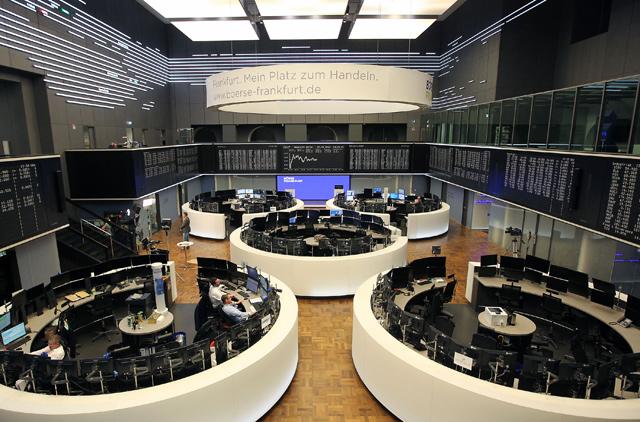You are here
Stocks rise on Friday as Powell cautious on stimulus withdrawal
By AFP - Aug 29,2021 - Last updated at Aug 29,2021

Traders work in front of a board displaying Germany's share index DAX (background) at the stock exchange in Frankfurt am Main, western Germany, as European stock markets rose,on Friday (AFP photo)
NEW YORK — Stock markets jumped on Friday after Federal Reserve (Fed) Chair Jerome Powell took a cautious stance on a potential withdrawal of the central bank's huge economic stimulus measures later this year.
Major Wall Street indices closed at records after Powell delivered his annual speech at the virtual Jackson Hole central banking symposium, while European trading ended positively after a quiet session.
Powell's address was closely watched for signs of the Fed's plans to reduce the bond-buying that has helped support the pandemic recovery, and for any indications of when the bank could see interest rates rising.
Despite the impact of the fast-spreading Delta variant of COVID-19, Powell said the US economy has continued to recover and shown strong job growth.
But he stressed that there was no hurry to raise interest rates, arguing that current inflation pressures will be temporary, and repeated the Fed's stance that "it could be appropriate to start reducing the pace of asset purchases this year".
His remarks came after some other Fed members had argued that the bank could taper its asset-buying scheme this year.
"We finally heard from the Fed chairman and the markets loved it, even though he said what many had expected, that tapering bond purchases could begin before the end of the year," said Fawad Razaqzada, market analyst at ThinkMarkets.
Powell's comments were "interpreted by the market as the Fed chair offering no fresh news and people who had betted on him providing some clear tapering timeline were left disappointed," Razaqzada said.
Asian markets, which closed before the speech, ended the day mixed.
Powell spoke after new government data showed that a key US inflation gauge climbed again last month and spending slowed.
The personal consumption expenditures price index — the Fed's preferred measure of price increases — rose at a rapid 4.2 per cent pace in July compared to the same month in 2020.
Spending dropped to 0.3 per cent, in what analysts viewed as a consequence of the Delta variant of COVID-19, making some consumers hesitant.
"While pandemic fatigue is setting in and leading to strong emotional responses, we believe cooler consumer spending growth is more likely than consumers retrenching and the economy going into reverse," Lydia Boussour of Oxford Economics said.
The surge followed a drop on Wall Street on Thursday, with sentiment jolted by geopolitical concerns after a suicide attack at Kabul airport that left scores dead, including 13 US servicemen.
Meanwhile, oil prices, which have enjoyed a strong run this week after recent hefty selling, saw more big gains on Friday as traders bought into the view that the Delta variant's spread will only delay the economic recovery and demand will continue to improve.
OPEC member states and their producer allies will hold their latest virtual output meeting next Wednesday.
Related Articles
WASHINGTON — The Federal Reserve (Fed) opened its two-day policy meeting on Tuesday, with investors around the world awaiting a signal on wh
LONDON — World stock markets rose on Monday, with Wall Street starting the new month on a steady footing ahead of a raft of new economic dat
LONDON — Stock markets rallied on Thursday after the Federal Reserve moved closer to unwinding its huge emergency stimulus.Equities have won

Opinion
Apr 07, 2025
Apr 07, 2025
Apr 07, 2025
Apr 06, 2025
- Popular
- Rated
- Commented
Apr 07, 2025
Apr 07, 2025
Apr 07, 2025
Newsletter
Get top stories and blog posts emailed to you each day.















